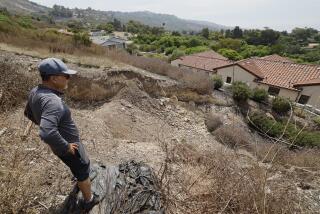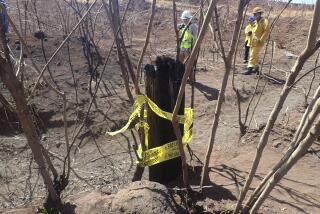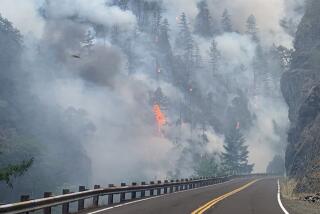Avalanche spurs Alaskan city to power down
- Share via
JUNEAU, ALASKA — First, there was a run on energy-efficient lightbulbs. When those ran out, people began asking for lamp oil. But when they started demanding clothespins in this land of mist and rain, it was clear that Alaska’s capital was caught in a serious energy crunch.
“We sold all our clothespins the first day,” said Doug White, general manager at Don Abel Building Supply. “I don’t think kids even knew what they were for, but they’re learning now.”
Avalanches knocked down transmission lines and cut off Juneau’s source of low-cost hydroelectric power a few weeks ago. Threatened with a fivefold increase in utility bills, Juneau quickly powered down.
Stores, though open, went partly dark. Neon signs were switched off and vending machines unplugged. At home, residents of this former Gold Rush town began living a little bit like pioneers, sweeping the snow off the grill, stringing clotheslines in the backyard and flicking off their TV sets. Within a week, electrical usage across town was down as much as 30%.
Energy conservation is a hard sell in much of the U.S., but Juneau has proved that people will change their ways if the financial incentives are big enough.
“Turn off, turn down, unplug,” said Sarah Lewis, chairwoman of the Juneau Commission on Sustainability. “That’s what everyone is doing and being vigilant about and commenting when others are not.”
The April 16 snowslides that roared out of the mountains some 25 miles southeast of town uprooted transmission towers and plowed through 1.5 miles of high-voltage lines that link this largely isolated community of 30,000 to the Snettisham hydroelectric dam. (The Legislature had already ended its session, and most lawmakers had gone home.)
As backup diesel generators shouldered the load, the electric company began warning customers that life in Juneau -- already expensive -- was about to get a lot more so.
With oil prices reaching a record $120 a barrel, Alaska Electric Light and Power said customers might have to pay for an extra $25 million in diesel over the three months it would take to repair the lines. The utility warned that rates would probably leap from an average of 11 cents per kilowatt-hour to more than 50 cents, or about five times the 10.3 cents that is the national average.
Conversations all over town turned from the governor’s new baby and the legislative session to kilowatt-hours, tariff rates and saving energy.
Heidi Graves said her 16-year-old son, Levi -- the one who never would turn off his Nintendo -- was the first to get on board. He was worried that the family of six would have to cancel its vacation next August.
Levi multiplied the usual electric bill by five and came up with $950. “It’s more than our house payment,” said his mother. Now members of the Graves family eat dinner by candlelight, do dishes by hand, dry their clothes on a rack by the wood stove and limit their time on the computer.
“My husband has bruised himself and tripped over the dog just to keep the lights off,” Graves said.
She also ordered a history of electrical use so that the family could ferret out which appliances were power hogs, and they learned how to read their own electric meter, which they now do several times a day.
Though the Graves family heats solely with wood, about one in five houses in Juneau is wired for electric heat because hydroelectric power is relatively cheap and natural gas is unavailable.
In part because Juneau is so far removed from the Lower 48 and is inaccessible by road, its cost of living is nearly 35% higher than that of the average U.S. city, and its housing costs are 50% higher, according to a survey of 300 American cities. Even an oil change is $60, twice what it costs in many places down south.
Energy expert Alan Meier of California’s Lawrence Berkeley National Laboratory visited Juneau recently to offer advice on the crisis. He said the closest comparison may be Brazil in 2001, when severe drought gripped the hydropower-dependent country. Brazilians were told to reduce their electricity usage by 20% or be disconnected.
“In two months, the whole country cut their demand by 20%, and they never really returned to the same level of consumption after that,” Meier said.
Eighth-grader Matthew Staley is hoping the people of Juneau will likewise develop new habits over the course of three months and “realize that -- wow -- we have to keep this up. Like switching to fluorescent lights, they’ll just keep on with them.”
More to Read
Sign up for Essential California
The most important California stories and recommendations in your inbox every morning.
You may occasionally receive promotional content from the Los Angeles Times.













